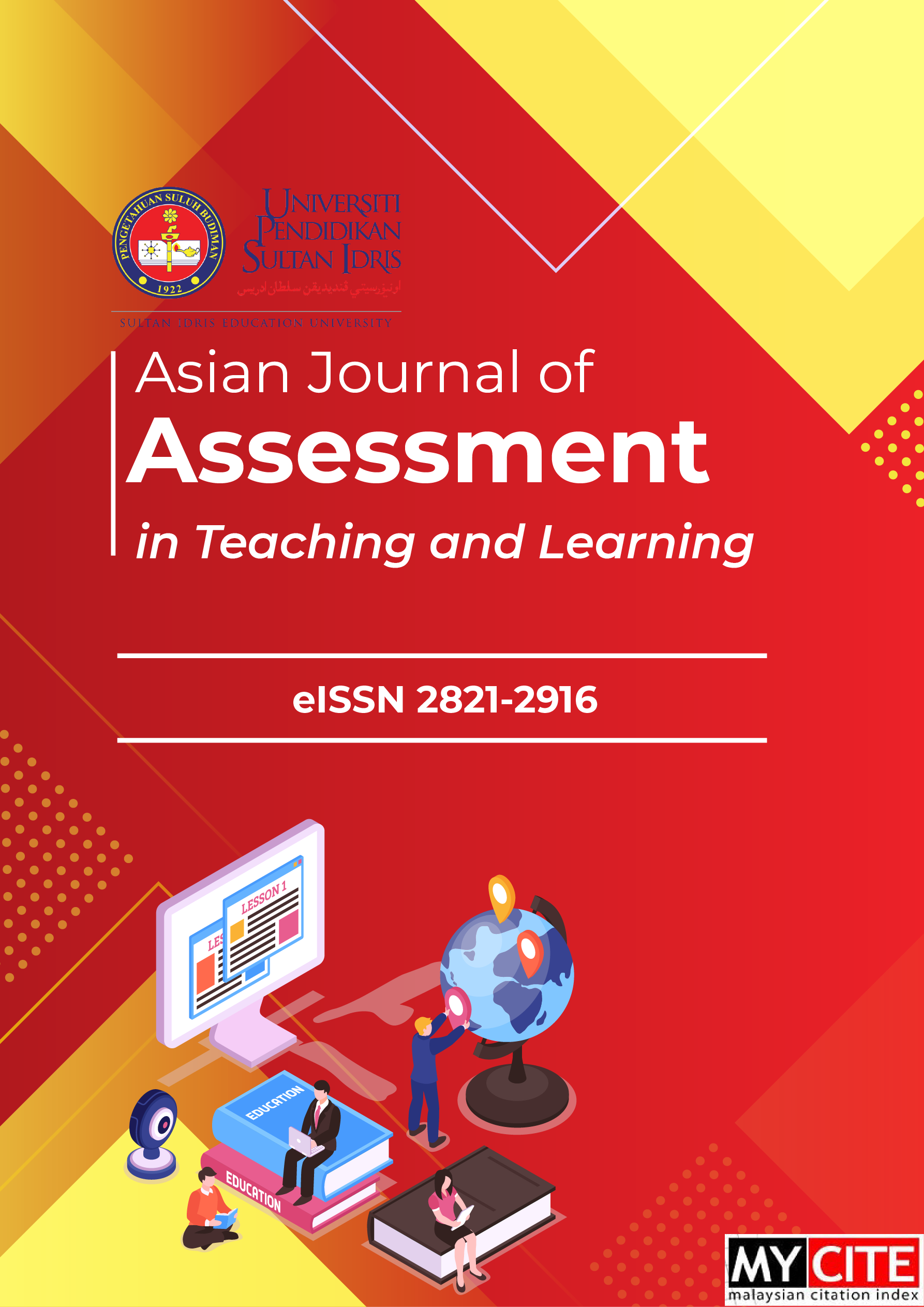Group dynamic assessment of the listening skill A ZPD-based Study of Iranian TOEFL iBT Candidates
DOI:
https://doi.org/10.37134/ajatel.vol11.2.6.2021Keywords:
Dynamic Assessment (DA), Zone of Proximal Development (ZPD), Static (non-dynamic) Assessment, Learning Potential Score (LPS), Group Dynamic Assessment (G-DA), Cumulative G-DAAbstract
The present study was an attempt to assess, diagnose, and enhance the listening skill of Iranian TOEFL iBT candidates through Group Dynamic Assessment (G-DA). An interactionist format of dynamic assessment was conducted in the present study. Twenty participants took part in the G-DA program which lasted for nine weeks; one week for the pre-test; seven weeks for the enrichment mediation program; and one week for the post-test. The study revealed a significant difference between the participants’ pre-test (non-dynamic) and post-test (dynamic) scores. The learning potential score (LPS) differentiated among the learners with similar pre-test scores. Finally, the analysis of the participants’ interactions with the mediator along with the LPS score helped the mediator to have a thorough diagnosis of each participant’s weaknesses regarding different sub-skills included in the listening section of the TOEFL iBT test. Consequently, the mediator was able to develop more fine-tuned individualized learning plans and materials for the participants.
Downloads
References
Ableeva, R., & Lantolf, J.P. (2018). Mediated dialogue and the microgenesis of second language listening comprehension. Assessment in Education: Principles Policy & Practice, 18(2).133-149.
Alavi, M. S., & Kaivanpanah, S., & Shabani, K. (2012). Group dynamic assessment: An inventory of mediational strategies for teaching listening. The Journal of Teaching Language Skills, 3(4), 27-56.
Alderson, J. C. (2019). Test of English as a Foreign Language™: Internet-based Test (TOEFL iBT®) Language Testing, 26(4), 621–631.
Aljaafreh, A. & Lantolf, J. P. (1994). Negative feedback as regulation and second language learning in the zone of proximal development. The Modern Language Journal, 78, 465–483.
Barabadi, E (2020). Designing computerized dynamic assessment of L2 reading comprehension of Iranian university students and its comparison with static test of L2 reading comprehension. Unpublished MA thesis. Ferdowsi University of Mashhad.
Davin, K. J. (2018). Group dynamic assessment in an early foreign language learning program: tracking movement through the zone of proximal development. Unpublished doctoral dissertation. University of Pittsburgh.
ETS (2019). The Official Guide to the TOEFL ® Test. Third Edition the McGraw-Hill Companies, Inc. New York. Springer
ETS (2018a). TOEFL iBT TM test framework and test development. TOEFL iBT TM Research • Series 1, Volume 1. Retrieved from https://www.ets.org/s/toefl/pdf/toefl_ibt_research_insight.pdf
ETS (2018b). Validity evidence supporting the interpretation and use of TOEFL iBT ™ scores. TOEFL iBT TM Research, Series 1, Volume 4. Retrieved from https://www.ets.org/s/toefl/pdf/toefl_ibt_insight_s1v4.pdf
ETS (2018c). Reliability and comparability of TOEFL iBT™ scores. TOEFL iBT TM Research Series 1, Volume 3. Retrieved from https://www.ets.org/s/toefl/pdf/toefl_ibt_research_s1v3.pdf
Fani, T, Rashtchi, M, & Birjandi, P. (2015).Examining the impact of concurrent and cumulative group dynamic assessment on reading comprehension ability of Iranian EFL learners. International Journal of Review in Life Sciences. 5(6), 798-804.
Fani, T. & Rashtchi, M. (2015). Dynamic assessment of reading comprehension ability: Group or individualized. Education Journal, 4(6), 325-331.
Hashemi Shahraki, S., Ketabi, S., & Barati, H. (2015). Dynamic assessment in EFL classrooms: assessing listening comprehension in three proficiency levels. International Journal of Research Studies in Education, 4(3), 17-31.
Kozulin, A. & Garb, E. (2012). Dynamic assessment of EFL text comprehension of at-risk students. School Psychology International, 23, 112–127.
Lantolf, J.P. (Ed.). (2019). Sociocultural theory and second language learning. Oxford: Oxford University Press.
Lantolf, J. P. (2019). Dynamic assessment: The dialectic integration of instruction and assessment. Language Teaching, 42(3), 355-368.
Lantolf, J. P. & Poehner, M. E. (2014). Dynamic assessment of L2 development: Bringing the past into the future. Journal of Applied Linguistics, 1, 49–74.
Lantolf, J. P. & Poehner, M. E. (2019). Dynamic assessment. In E. Shohamy (ed.), The Encyclopedia of language and education (vol. 7): Language testing and assessment. Oxford: Springer.
Cambridge: Cambridge University Press, 273–285.
Lantolf, J.P., & Poehner, M. E. (2018) Dynamic assessment in the classroom: Vygotskian praxis for second language development. Language Teaching Research, 15(1), 11-33.
Mehri, A. K. (2018). Assessing and promoting grammatical knowledge of Iranian EFL learners through computerized dynamic assessment; An interventionist approach. . Unpublished MA thesis. University of Tehran.
Mehri, E & Amerian, M. (2015). Group dynamic assessment (G-DA): the case for the development of control over the past tense. International Journal of Applied Linguistics & English Literature , 4(5), 11-32
Poehner, M.E. (2017). Beyond the test: L2 dynamic assessment and the transcendence of mediated learning. The Modern Language Journal, 91,323–340.
Poehner, M. E. (2019). Dynamic assessment: a Vygotskian approach to understanding and promoting L2 development. Berlin: Springer.
Poehner, M. E. (2019). Group dynamic assessment: Mediation for the L2 classroom. TESOL Quarterly, 43(3), 471-491.
Poehner, M. E. & Lantolf, J. P. (2015). Dynamic assessment in the language classroom. Language Teaching Research, 9, 233-265.
Poehner, M.E. & Zhang. J & Lu, X. (2015). Computerized dynamic assessment (C-DA): Diagnosing L2 development according to learner responsiveness to mediation. Language Testing. 32(3), 1-21.
Shabani, K. (2014). Dynamic assessment of L2 listening comprehension in transcendence tasks. Procedia - Social and Behavioral Sciences, 98, 1729 – 1737.
Vygotsky, L. (1978). Mind in society. Cambridge: Harvard University Press.
Zhang, Y. (2013). The theoretical construction of a dynamic assessment mode in Chinese tertiary EFL writing class with online teaching and scoring system. CALL-EJ, 14(2), 38-50.
Downloads
Published
Issue
Section
License
Copyright (c) 2021 Hamed Ghaemi, Malihe Houshangi

This work is licensed under a Creative Commons Attribution-NonCommercial-ShareAlike 4.0 International License.





